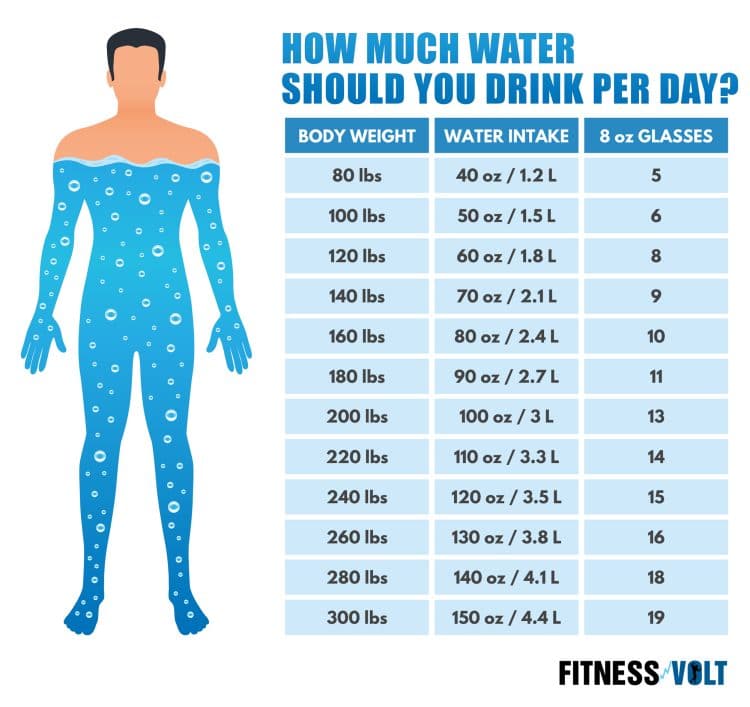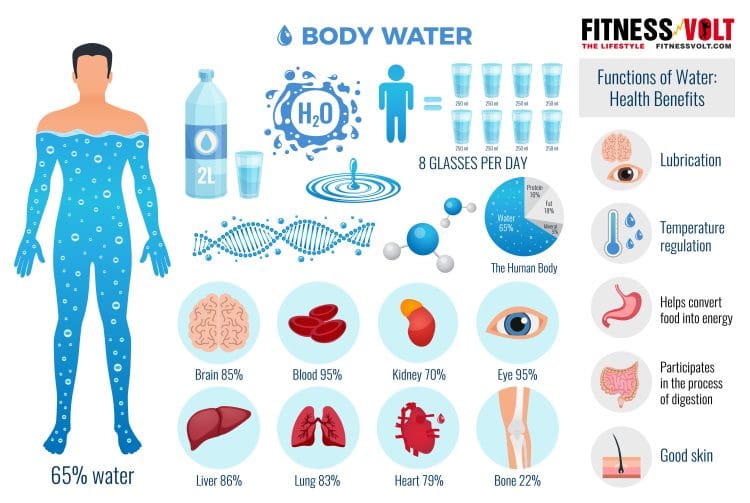When you hop on the scales to weigh yourself, the reading you see is the sum total of everything within your body. That includes the weight of your skin, muscle, bones, organs, and even the food currently in your stomach.
However, water is the most abundant substance that makes up your body weight. You are literally full of the stuff!
But, how much water does the average human contain? Use this calculator to find out!
Total Body Water Calculator
[sc name=”tbw-cal” ][/sc]
What is Total Body Water (TBW)?
Total Body Water (TBW) is an estimation of how much of your body weight is water. It’s generally believed that the average male body is made up of 60% water. In comparison, the average female is 50% water. Still, these suppositions fail to take into account things like body weight or age.
The TBW calculator uses two different equations to more accurately estimate the volume of water contained within your body.
While there is nothing much you can do to influence your TBW results, it is a valuable reminder of how important good hydration is and why you need to drink plenty of water every day.
How is Total Body Water Calculated?
Our Total Body Water calculator uses two equations to estimate the volume of water in your body. Those equations are:
[sc name=”style-blue-box” ]
Watson Formula:
- Male TBW = 2.447 – (0.09156 x age) + (0.1074 x height) + (0.3362 x weight)
- Female TBW = -2.097 + (0.1069 x height) + (0.2466 x weight)
Hume-Weyers Formula:
- Male TBW = (0.194786 x height) + (0.296785 x weight) – 14.012934
- Female TBW = (0.34454 x height) + (0.183809 x weight) – 35.270121
[/sc]
Needless to say, these equations are quite complex, and while you are welcome to do them using a pen and paper, there is no real need as our calculator is designed to do all the math for you!
How to Use the Total Body Water (TBW) Calculator
Like all good physiological calculators, our TBW calculator is very straightforward to use. Just follow these steps to get your results in seconds:
- Choose between imperial (pounds, feet, inches) or metric (kilograms, meters, centimeters) units.
- Select male or female.
- Enter your weight.
- Enter your height.
- Enter your age in years.
- Hit “Calculate“.
If any of the boxes are outlined in red, you have entered an incorrect value. Go back and input the correct information, and the calculator will work correctly.
What Do the Results Mean?
Your total body water is the amount of water contained within your body. Our calculator expresses your total body water in three ways:
- Volume in liters and fluid ounces.
- Weight in kilograms and pounds.
- As a percentage of your body weight.
You will also see two sets of results, one using the Watson formula and the other using the Hume-Weyers formula. Both sets of results should be very similar.
This chart represents the average and range reference percentage values for TBW by gender and age:
| 12 – 18 years | 19 – 50 years | > 51 years | ||||
| Average | Range | Average | Range | Average | Range | |
| Male | 59% | 52-66% | 59% | 43-73% | 56% | 47-67% |
| Female | 56% | 49-63% | 50% | 41-60% | 47% | 39-57% |
Water is stored all around your body and is broken down into the following two compartments:
1- Intracellular fluid (2/3 of body water) is the fluid contained within cells.
2- Extracellular fluid (1/3 of body water) is the fluid contained in areas outside of the cells, including:
- Plasma (1/5 of extracellular fluid), which is a part of total blood volume.
- Interstitial fluid (4/5 of extracellular fluid).
- Transcellular fluid (a.k.a. “third space,” typically ignored in calculations) contained inside organs, including the gastrointestinal tract, cerebrospinal fluid, and ocular fluid.
The roles of these fluids include:
- Cellular metabolism
- Metabolism and transport of proteins and carbohydrates
- Transportation of blood cells
- Temperature control
- Elimination of waste
- Lubrication of the digestive tract
- Part of the fluid protecting the brain and spine
Even a small decrease in essential water levels can cause a drop in mental and physical performance (3). Chronic dehydration is linked to a host of medical conditions, including urinary tract infections, kidney problems, headaches, muscle cramps, brain fog, flaky or inelastic skin, joint pain, back pain, heatstroke, unconsciousness, and death.
[sc name=”style-blue-box2″ ]
It’s pretty clear that water plays a crucial part in almost every physiological reaction, so it’s essential to stay well-hydrated. Use this water intake calculator to make sure you are getting enough.
[/sc]
Total Body Water (TBW) Calculator FAQs
1. What is TBW?
TBW is short for Total Body Water and is an estimation of the volume of water in your body. Average water volume varies by gender, age, and body weight and is often said to be 60% for men and 50% for women. However, using two different equations, our TBW calculator will provide a more accurate figure.
2. How much water do I need to drink?
It’s often said that you should drink eight 8-ounce glasses of water per day to total 64 ounces. However, given that actual water volume varies from person to person, it makes more sense to adjust your water intake according to your needs.
Use a water intake calculator to determine how much you should drink, or use this simple water-by-bodyweight chart:

3. How do I know if I’m drinking enough water?
The most widely accepted indicator that you need to drink more water is thirst. However, thirst often comes on after mild dehydration has already set in, so it’s generally best to drink enough water that you avoid thirst in the first place.
Other signs you may be dehydrated include:
- Dark yellow urine
- Lack of urination
- Constipation
- Low energy/fatigue
- Dry skin and lips
- Headache

Avoid these problems by drinking little and often. Start your day with a large glass of water and continue drinking regularly until bedtime. That way, you should have no problem consuming all the water you need to stay hydrated.
Please note that other fluids are also hydrating, including fruit juices, tea, coffee, milk, etc. However, because they aren’t pure water, some of the fluids consumed may not contribute to your hydration levels.
That said, the impact of carbohydrates, caffeine, fiber, etc., is smaller than once believed, and even coffee can still contribute to your water intake.
4. Can I lose weight by losing water?
Water is heavy stuff, and one liter weighs one kilo. As such, losing water can have a significant impact on your body weight. You may even find that you weigh several pounds less after a sweaty workout.
However, while you may weigh less, you won’t have lost much if any fat weight, and any pounds dropped will quickly return after you’ve drunk some water.
Athletes who compete in weight categories, such as wrestlers, MMA fighters, powerlifters, etc., purposely manipulate their water intake and volume so they can weigh-in at a lower weight before competition. After the weight-in, they then rehydrate to return to their natural weight.
So, yes, you CAN lose weight by losing water, but the effect is only temporary, and your fat mass won’t change much, if at all. Also, you’ll regain any weight lost as soon as you rehydrate. The dangers of severe dehydration are well known and can cause coma and death if taken to extremes.
Read more about losing water weight here.
5. Is it possible to drink too much water?
Although your body needs plenty of water, you can have too much of a good thing. However, overhydration is pretty hard to achieve. The most likely candidates for consuming too much water are:
- Long-distance hikers and trekkers
- Triathletes
- Ultra-runners
- Long-distance cyclists
- Military personnel on training exercises
- People new to living in a hot climate
- Mountaineers – especially at high altitudes
Consuming too much water can lead to a dilution of electrolytes, which are essential minerals used to control electrical impulses and maintain correct cellular fluid balance. The electrolytes include sodium, potassium, and calcium. This condition is properly called hyponatremia.
Hyponatremia can result in:
- Weakness
- Fatigue or low energy
- Headache
- Nausea
- Vomiting
- Muscle cramps or spasms
- Confusion
- Irritability
- Overactive reflexes
- Loss of consciousness
- Seizures
- Coma
- Death
So, while it is essential to stay well-hydrated, it’s best to avoid extreme water consumption. If you do need to drink a lot of water, for example, because you are training in a hot climate for long periods, make sure you also consume electrolytes with your water to reduce the risk of mineral dilution.
Total Body Water (TBW) – Wrapping Up
It’s often said you are what you eat. But, it turns out, you are also what you drink. After all, your body contains as much as 60% water! As such, you must stay well-hydrated by drinking enough water every day.
Water is especially important for exercisers. You lose water through sweat and exhalations, so you must replace what you use to keep your body functioning correctly. Remember that water weight loss is only temporary, and when it comes to getting in shape, it’s fat you want to lose.
Use our Total Body Water calculator to see just how much water your body contains.
References:
1– PubMed: Total body water volumes for adult males and females estimated from simple anthropometric measurements https://pubmed.ncbi.nlm.nih.gov/6986753/
2– PubMed: Relationship between total body water and surface area in normal and obese subjects https://pubmed.ncbi.nlm.nih.gov/5573437/
3– Journal of Strength and Conditioning: Impact of Mild Hypohydration on Muscle Endurance, Power, and Strength in Healthy Active Older Men https://journals.lww.com/
4– PubMed: Complications and management of hyponatremia https://pubmed.ncbi.nlm.nih.gov/26735146/


